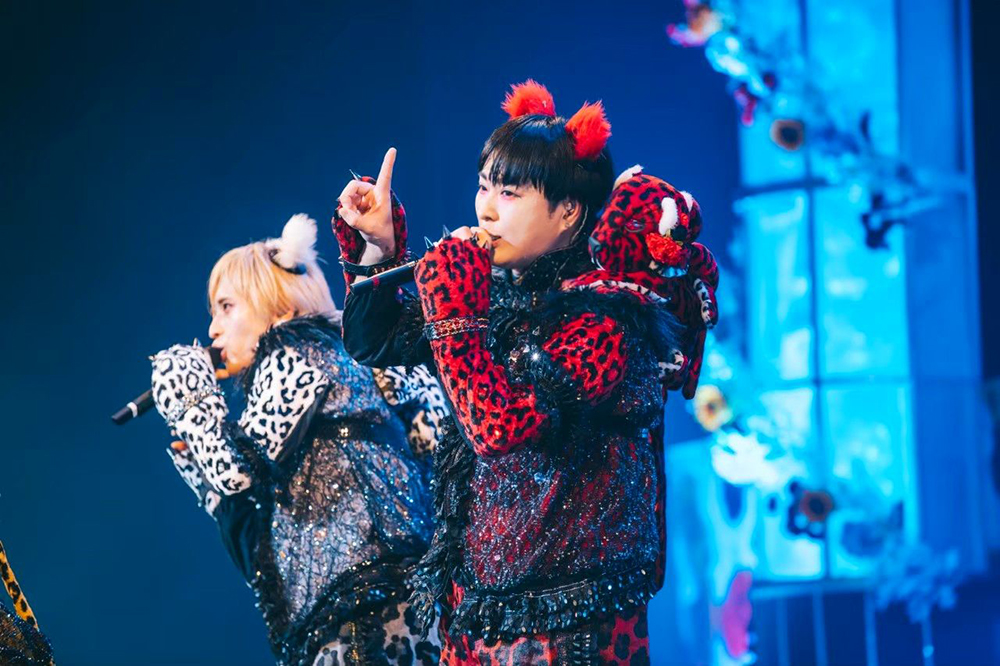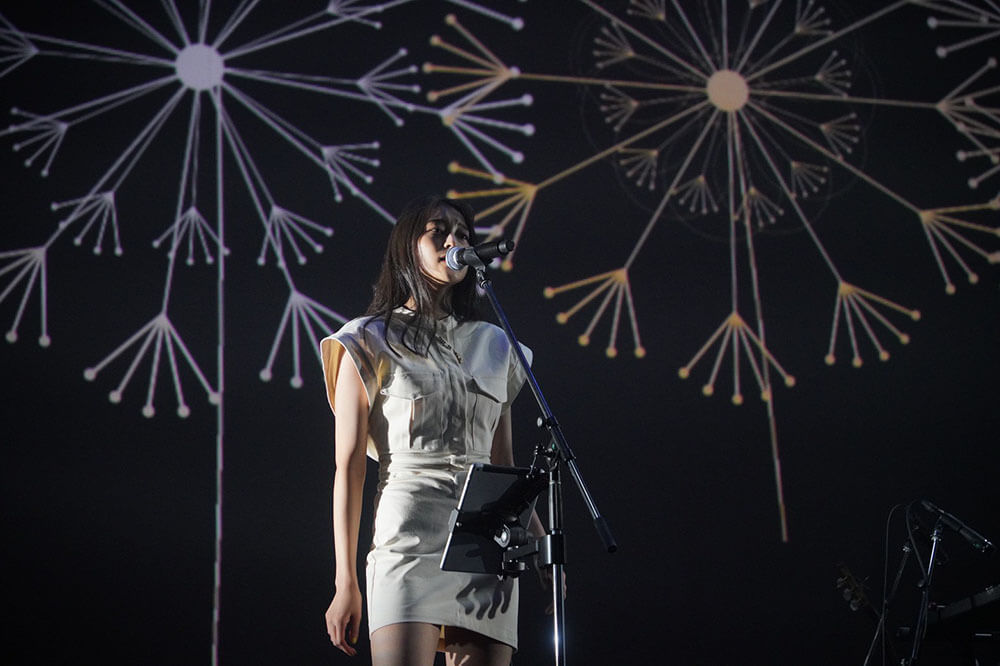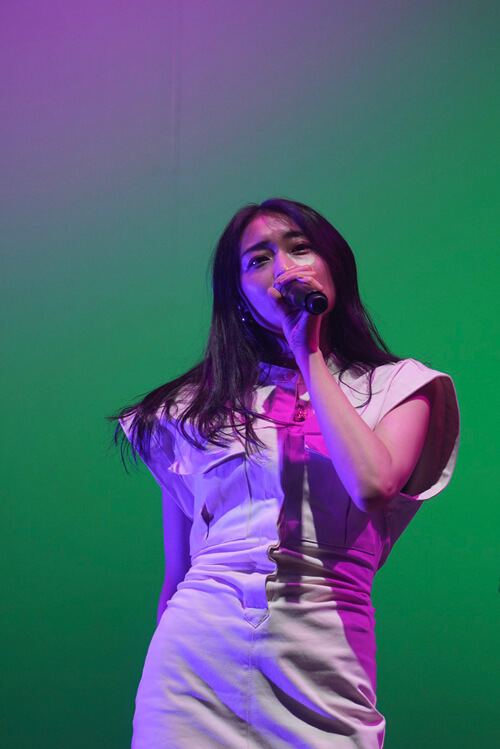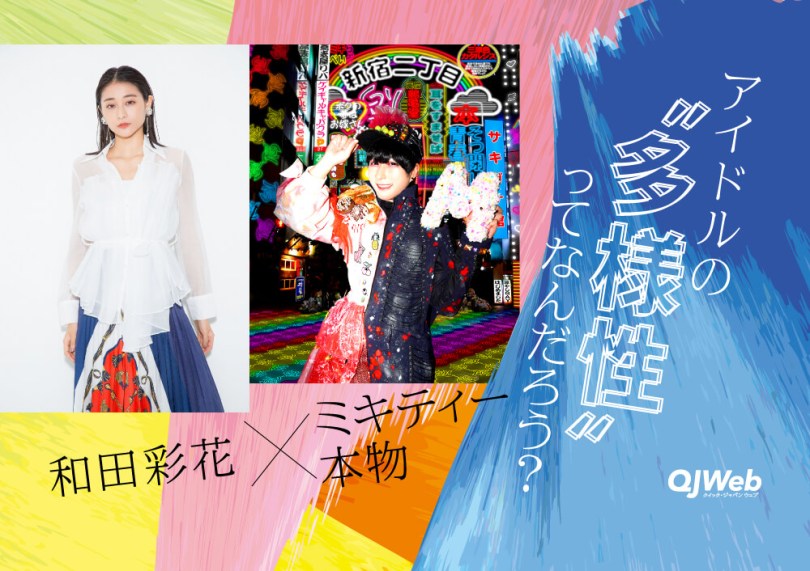This interview was initially posted on Quick Japan Web on October 2, 2020.
Note: “Mikitty” doesn’t refer to Fujimoto Miki (Mikitty), but to Mikitty Honmono, a member of the gay idol group Nichoume no Sakigake Coming Out.
“I can live for myself.” “I don’t have to give up because I’m gay.”
Wada Ayaka is an idol who is against dictating what female idols should be and pushes for letting them be who they want to be.
Mikitty Honmono is a gay idol in an industry where the lines between male and female are clearly defined.
In recent years, Mikitty Honmono’s group Nichoume no Sakigake Coming Out performed at the world’s biggest idol festival, TOKYO IDOL FESTIVAL. There’s also AKB48’s Kashiwagi Yuki, who announced that she wouldn’t be graduating even at 30 years old. Two Negicco members have decided to continue working as idols after getting married, a choice that was supported by fans. One could think the idol industry is becoming more diverse. What do our interviewees have to say on this topic?
“Many people expected me to say funny things because I’m gay.”
— Mikitty Honmono, what’s your impression of Wada?
Mikitty: I started out in the Shinjuku Nichoume-based idol unit Nichohalo, in which we danced to Hello! Project songs. Since Ayacho (Wada Ayaka) debuted as a member of S/mileage around the time I founded Nichohalo and started performing on stage, it’s like we’re colleagues from the same era.
I watched her growth from her audition, as if she were my little sister. She used to have more of an airhead character, but as the leader of ANGERME, she brought the members together and wasn’t afraid to state her opinion. I was surprised she became such an amazing woman.
This might sound bad, but there are people who, after graduating and going solo, are just rubbing their old fans the right way. Then, there’s Ayacho who puts her own words on music and expresses herself. I think she’s a remarkable woman.
— Wada, how do you feel about this?
Wada: Idol groups are split into categories, male and female with clearly defined roles. In society, there are people who are different and don’t belong in neither category. That’s why I think Mikitty Honmono’s group, its existence, is absolutely wonderful.

— You both felt suffocated because of gender role expectations. How do you relate this to being an “idol”?
Mikitty: I figured out I was gay when I fell in love with a guy for the first time. I was in middle school, and he wasn’t gay, so I couldn’t confess to him. Starting from there, at school and work, I’ve given up on a lot of things, including jobs, because I’m gay.
It was when I first stood on stage that I realized I had given up on so much with the excuse of being gay. After this, I wanted to lead a life where I wouldn’t give up because I’m gay. So, I created a group with this concept: “Even if you’re gay, you can be an idol”. This implies that not only gay people, but anyone, can be anything.
— In a past interview, you said that you felt frustrated as you were pressured to be funny because you’re gay. Could you tell us more?
Mikitty: Many gay people you see on TV are hilarious and come up with great jokes one after another. There’s also this idea that Shinjuku Nichoume is full of fun and happy people. It may be partly why I’ve met lots of people who expected me to say funny stuff when I told them I was gay. I thought I needed to meet their expectations, so I put on a fake bright, funny act.
The truth is that I’m not always happy because I’m gay. I worry over trivial things and mess up like everyone else. I’m making music and showing a larger-than-life version of myself as a way to make people understand this.
That uncomfortable feeling when someone says: “I want gay friends.”
— Nichoume no Sakigake Coming Out mostly sings about youth and nostalgia, topics anyone can relate to. Do you avoid using “gay” as a gimmick consciously?
Mikitty: It’s not that I avoid it consciously, I’m just expressing myself as I am. I don’t think “gay” or “not gay.” I write songs as a human being, so they come out like this naturally.
Something that made me feel uncomfortable was that, when I had many idol friends, a lot of them wanted to hang out with me because I’m gay. They couldn’t ask girls for relationship advice and couldn’t be friends with guys because of work, so I was like their go-to person for advice.
While I’m glad they were relying on me in a way, it does feel a bit weird when people I’ve never talked to want to be friends with me because I’m gay. I’d be so happy if they said they wanted to be friends with me because I’m Mikitty Honmono. If they say I can understand both men’s and women’s feelings because I’m gay, now, it depends on the person.
Wada: Many people around me have said that they wanted to be friends with gay people, yet most of them also rejected homosexuality. I do remember wondering if it was the way average people of my generation thought, and I felt it was strange.
At that time, I also questioned my own sexuality. I’ve liked girls in the past, and I spent 25 years of my life not knowing my sexuality or where I stood.
Listening to Mikitty Honmono’s story helped me put things in order. Now I understand my feelings and the meaning of others’ words, and it’s like the fog has lifted.
Regardless of gender, and race or nationality, we’re all human. So, why are we put into boxes, people who reject and others who are rejected? Your story made me think that, because of the “gays are like this” box, these people don’t see the person that you are. It was these kinds of words that confused me.
Natural as a “narrow” requirement for idols
— Wada, how did you feel about your gender role?
Wada: While I was confused about my sexuality, I also felt strong pressure to act in a certain way because I’m a woman. In some cases, you can’t do anything about it because of social constructs, but it has never aligned with my feelings.
Studying art in university made me realize how restricted my world was. I questioned things I found strange. Through art, I understood the importance of expressing these contradictions in my own words, but I just couldn’t do it. The reason is that, as a woman, I’m not supposed to speak out. I should conform. I was confused by these ideas that were forced upon me.
— You were criticized for wearing red lipstick and advised not to open your mouth too wide on pictures, which must have played a part in this. I have this impression that you took a lot of pictures with your mouth wide open after going solo.

Wada: Just like your schoolbag “has to be red” because you’re a girl, I was forced upon this view that opening your mouth too wide isn’t “womanly.” Also, as my job was being an idol, I was required to be “natural.”
Orange is one of my favourite lipstick colours, but that wasn’t “natural.” I had no choice but to wear light pink, so I asked myself what “natural” even meant. These thoughts kept piling up, and I realized the world I was in had a very narrow definition of an idol.
I personally like having black hair, yet, I felt weird about it because I was imposed the idea that “having black hair means I’m conventional.” Not only gender, but occupation, nationality, and even race… People aren’t defined by these boxes. It occurred to me at some time.
— The idol industry is hard to define as it has a wide range of concepts and song types and people have different views on what an idol is, so you felt uncomfortable to be forced upon specific views.
Wada: I’m using the “idol” name to raise questions or point out problems I had in my 15 years as an idol, one by one. By doing this, I hope I can make the current “idol” box more colourful.
Idols are performers, so they’re definitely playing a role in creating the world they’re bringing to life. I believe that, because they have an opportunity to express themselves, they should have as many choices as possible.
Two labels to choose from: “idol” or “activist”*
*Translator’s note: Word play. 活動家 means “activist”, but can be interpreted as “active professional” (as in an artist who does multiple unspecified jobs, like an idol.)
— When you started your solo activities, you made a powerful statement on your official site about being an “idol”. What was your thought process behind this choice?
Wada: I thought about what I wanted to do and hesitated between two labels: “idol” and “activist.” I want to express many different things, and it was easier to convey them within the “idol” box. So I called myself an “idol.”
— How does Mikitty Honmono feel about rules in idol groups? You were once a Hello! Project fan, so I’d like to hear your opinion from this standpoint. Fans must think some things can’t be changed.
Mikitty: It’s important to keep in mind that idols are human too, but every group has its own style, so they can’t just do what they want.
For example, if you’re joining a group that’s selling a conventional image, you should be aware from the start you’re not supposed to wear dark red lipstick and thick eyeliner. You can’t change that, you know. It’d be better if you joined a group that fits your image.
What makes it hard is that humans change every day. We want to try new things, have a new haircut and wear new makeup. When you reach that point, you can graduate happy and take your next step in life. I fully approve of that.
I don’t think setting rules is a bad thing in itself. Our group has some too, and they’re actually stricter than any other group’s.
Wada: Really? What kinds of rules do you have?
Mikitty: First off, since we want to keep a good balance when members are standing next to each other, you’re not allowed to change hairstyle without the producer’s approval. In addition, going out at night and drinking alcohol in public is basically forbidden, so we don’t even hang out in Shinjuku Nichoume.

Wada: So you’re discipling yourselves. Why do you have such rules?
Mikitty: As the producer, I have an image of what an idol is. I set the rules and decided we’d go along at the beginning.
The reason why we don’t go to Nichoume or drink in public is that I don’t want people to assume that us being gay means we always go to Shinjuku Nichoume or drink like we’re partying. I used to be strangely influenced by what I saw in the media and don’t want to reinforce such stereotypes. I set these rules with the original members, so I’m thinking the daily rules will change, though.
“We always aimed to perform at TOKYO IDOL FESTIVAL.”
Wada: It’s interesting seeing our similarities and differences. Mikitty Honmono is disciplining himself to reach his ideal image of an idol. As for me, because I was restrained and repressed, I’m heading towards liberation. The way we’re expressing ourselves is different because we have different standpoints and thoughts.
Mikitty: I felt more restrained back when I was hiding that I was gay. I feel more liberated nowadays, when I made it clear that I’m gay and fans tell me: “I don’t care about your sexuality, I love Mikitty Honmono.”
We set those rules together so we could be the best idols, so they’re close to our heart. I believe we feel this way because we set them ourselves.
— In 2017, Nichoume no Sakigake Coming Out took part in the world’s biggest idol festival, TOKYO IDOL FESTIVAL (TIF). That was an important step for diversity in the idol industry.

Mikitty: We took part in different idol festivals before that, but we were just never invited to TIF. We always aimed to perform at TIF.
One of the ways to perform at TIF was through an audition where fans gave you points, but we didn’t want to put a burden on our fans so we didn’t go for that. We decided we’d keep working hard until TIF contacted us themselves and recognized us as idols.
Every year, we were always excited to know if we could take part in this year’s festival. When we ended up not going, we’d just tell ourselves to work hard for next year. The day we heard we would be performing, we were so happy. We told each other that we had finally broken down the wall. Fans were also super happy and it was like a big celebration.
— In retrospect, what was the meaning of gay idols performing at TIF?
Mikitty: We hope to eventually live in a society where the expression “gay idols” doesn’t exist. If groups without gender restrictions keep popping up, then “gay idols” won’t be special anymore and the expression will die out. So, the fact that TIF invited us to perform was a step towards this goal. I want TIF to be one of the leaders that make the idol industry more prosperous.
“I’m not an idol for fans’ sake, but for my own.”
— There’s this firm image of the female idol industry as a place for young idols only. Yet, in the last few years, we’ve seen AKB48’s Kashiwagi Yuki say she won’t be graduating, even at 30. Negicco members Nao☆ and Megu decided to keep working as idols after getting married, with fans supporting them. Many fans don’t care about age or marriage and keep backing their idols. What are your thoughts about this?
Wada: Everyone, no matter their age, has an idea of who they want to be. I think it’s great that you can keep being an idol at any age and after marriage and that your choice is supported.
Mikitty: I also think idols are ageless. Nao☆ and Megu made a fantastic choice and I congratulated them. In their case, they had been working as respectable idols and humans and had a lot of support. That’s why, incidentally, they were congratulated by everyone. That doesn’t mean everyone should keep working as an idol after marriage.
I’m a big fan of Nacchi (former member of Morning Musume Abe Natsumi). Even if she got married, in my heart, she’ll forever be an idol. No matter how old they are or if they’re married, idols are living in our heart.
Fans and the public will react differently depending on the way you handled yourself in your work, if you were earnest or not. As a fan, I’ve seen idols who stopped, although I was hoping they’d continue. Ayacho is still an idol, so her fans must be happy, and I think she’s a ray of hope for other idols.
— Wada, have you ever thought about “meeting fans’ expectations”, as Mikitty Honmono discussed?
Wada: I felt bound to “idol” as my job and to “woman” as my gender, so it’d be hard meeting those expectations. If I were to continue working as the “idol” so many people are expecting, I’d probably be banned from having relationships and wouldn’t be free to do various things.
I’d rather show you have the choice to live for yourself. I’m not working as an idol only for fans, 100% for fans, but because I want to do it myself.
Many fans from my time in ANGERME support my way of thinking and I felt warmly accepted by them. After going solo, some people started supporting me because I expressed these thoughts, which I find reassuring.

Mikitty: From a fan standpoint, I don’t want to see idols suppress themselves. I used to desperately put on a funny act when I’m really a gloomy person. After I showed my real self, fans told me that they like the natural Mikitty Honmono better. Right now, Ayacho is very natural and wonderful, so I’m thinking your fans are happy too.
“Diversity is spreading and becoming the right thing, and it’s scary“
— Everyone should be who they want to be, and others should respect that. Don’t you feel this leads to “diversity”?
Wada: I believe the ideal society is diverse, and I want to be a part of that. Nonetheless, there are people who are embarrassed to express themselves and I can’t force them.
What I want to do is support someone’s move towards something they’re aiming for, no matter what shape it takes. It’d be fantastic if we lived in a society where everyone around us were supportive of that.

Mikitty: In my case, I was lucky to have family members, friends and coworkers who accepted I was gay. I also had fans who accepted it when I became an idol.
Still, I have plenty of friends who can’t tell their parents, aren’t acknowledged or can’t come out. Like Ayacho said, you’re the one who decides whether you want to express yourself or not, but some people want to do it and can’t.
That’s why I try not to say that you should “live your life the way you want to”; it weighs on people. It’s a bit scary to think the word “diversity” is spreading and becoming the right thing.
— Based on your own experiences, do you have any advice for people who want to take a new step, but are giving up because it’s hard?
Mikitty: Everyone is scared to take the first step, but by doing it, whether it be a good or a bad experience, you’ll learn to love yourself. I didn’t like myself when I gave up on everything, but by trying new things, I learned to appreciate myself little by little.
Even if you fail, there might be something good waiting for you when you look down. That’s how life works.
Wada: My opinion is that you don’t know something if you haven’t tried it. First, you have to try. Then, you can continue or change your ways. Thinking back, I’ve said things in the past that I find embarrassing and there are many things I only knew when I tried them.
Sometimes, I feel down because of people’s reactions to what I say, so I strive to be stronger. I’d like to hold my beliefs without letting others’ reaction get to me. Every day, I read books and learn continuously to achieve this.
Source: https://qjweb.jp/feature/40683/

Thank you so much for this important work. I love Ayaka even more now. Very pertinent subject!
LikeLike
Thank you so much for your translation. I had tears on my eyes while reading, it feels sooooo nice to see someone I love so much (Ayaka) bloom into such a smart and wonderful human being, I’m so proud of her.
I didn’t know about Mikitty, but I’m glad I do now. Finally I found someone who thinks like me, sometimes the idea of being brave is not enough and it can be dangerous, coming out can be really hurtful if you don’t have a environment that supports you and loves you.
I’m always praying for the day when the concept of coming out doesn’t longer exists.
LikeLike
😭😭🙏🙏
LikeLike